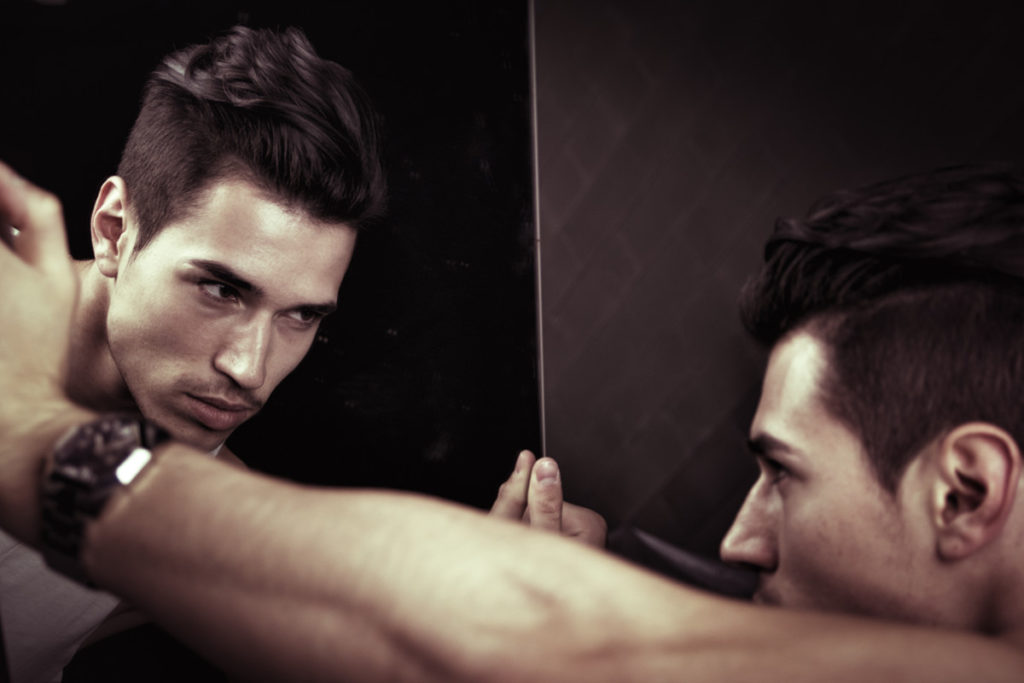
When you wear extra layers of clothing, even when it’s not really part of the look you’re going for, or to keep warm; or when you stand to the back of every group photo; or when you avoid the gym, the pool, the beach, the hiking trail, or anywhere where you might wear less clothing; or or when you turn down social invitations because you just don’t want to be seen by a group, it’s possible there is something troubling you about your looks, at least to you. Is it your height? We aren’t all 6′ 4′. Weight? That can vary a lot, too. Hair color? Again, varies. Hair density? Boy, is that a multi-million-dollar business, for gay men, too, but often for straight men.Or, maybe it’s “the” main one I hear about: body image/physique.
In my private practice in psychotherapy, I hear about that one probably more often than any other self-concern (with the possible exception of how much money a guy earns).
-
- Although statistics are hard to nail down, cosmetic surgeons say gay guys are the hot new market (just look at their ads in all the free gay papers, often advertising in the costly inside front or back covers).
-
- Gay men have more eating disorders than hetero women; a study by researchers at Columbia University reports 15 percent of gay men have had anorexia or bulimia.
-
- Responding to a poll conducted in Great Britain, nearly 50 percent of gay men said they would give up a year of their life to have a perfect body now, and 10 percent said they would give up 11 years of life. Life. Think about what that means.
-
- Research shows hetero men are the group happiest with their bodies. Lesbians and straight women are next, and gay men are least satisfied. That’s a pretty sobering statistic; that among so many groups of contemporary Americans, we are the most “out of line about the waistline”.
Where did all this body dysmorphia come from? You could answer that from your own experiences, probably. When you grow up worrying that your body is betraying a big secret, when you’re told there’s something fundamentally sick/bad/wrong with who you are, you’re likely to be dissatisfied with how you’re put together. And, when your sexuality is the only definition that seems to matter to anyone, being sexually attractive takes on a whole disproportionate importance.
While I myself am active in the fitness lifestyle, working with qualified personal trainers and even into some amateur bodybuilding, I strongly believe there is a “right way” and a “wrong way” to approach this. If you’re working out to defend against a deeply-ingrained sense of inferiority, I think that’s the “wrong” way. If you’re having fun with it, enjoying the challenge, doing physical programs that are medically supervised (such as weight loss or bodybuilding) by a qualified Medical Doctor, and focusing on the joy of physicality, I think that’s the “right” way. Although that’s somewhat judgmental language, I think we see some of both approaches in the gay men’s community. I think a comprehensive approach to physical and mental health in a healthy, mindful context is what pays off in the long run (I’ve been working out in a gym now for 35 years).
Finding satisfaction with how you look is going to take some effort. Here are some general tips:
-
- Of course, you can put your energy into getting fit. I see guys all the time joining bootcamp, crossfit, spinning, and many other things that are fun, and good for you — and will help get you leaner, stronger, or more flexible. There’s nothing wrong with being strong and healthy, but there can be a problem with keeping it all in balance, especially regarding the expenditure of time/money/effort on your physique versus, say, anything else (relationships, work, savings, skills, civic contributions, activism, school, hobbies, friends). The quest for the Perfect Body is always a losing battle because “perfect” doesn’t exist, because the definition of it can vary from person to person, moment to moment. It can also be a vicious game: you get the abs shaped up, then you’re not happy about your thighs, or your forearms, or your shoulders. That quest never ends. That guy next to you on the elliptical machines is always — always — going to have something you don’t. Get satisfaction out of feeling good in your skin and let the rest go. Your only competition is yourself.
- Get into touch with your body in other ways. Get a massage. Take a yoga class. Learn the tango. Jump on a trampoline. Find a park to lie down in the grass and feel the sun on every part of you, from your toes to that little spot on top of your head where the hair is thinning. Enjoy the animal pleasure of just being physical.
- Go out in public and pick out an Average Joe and identify the things that make him attractive in his own way – strong wrists, a sense of clothing style, an easy saunter, nice smile, a gentle touch on the dog leash. Do the same for yourself in the bathroom mirror, and no “but’s” allowed.
- Get interested in the inner man. Read good books, learn a new skill, search out ways to make someone else’s day better. Find role models who are spectacular in ways other than the physical.
- Think about the figures you most admire in history, literature, the arts, science, and politics — especially the male ones. (Go ahead; I’ll wait.) Now think about their appearance. Was their physicality, or appearance, the first thing you thought about to admire in these people? I didn’t think so. Well, it’s the same for you. Your legacy — enduring, and immortal — will probably be based on something other than your physique, so keep that in mind when you’re running your life, at every stage. If the people you admire in history were only focused on their bodies when they were young adults, they probably never would have become historical figures at all. They were too busy laying the foundation for future greatness in science by studying the basics, or working out the kinks in an invention for something they later became famous for. Even those with great bodies in the past, such as Mark Spitz (Olympic gold medalist swimmer, 1972) or Mitch Gaylord (Olympic gold medalist gymnast, 1984), both gorgeous in their own right, cultivated other talents for different stages of life.
- Get a dog or other pet. They are a great lesson in learning perspective in life. Who’s going to love you better, just as you are?
- Challenge unrealistic expectations. It is far more noble to be yourself and challenge the peer-pressure/status quo, than it is to put all your efforts into conforming to some kind of elusive “ideal”. That’s like being “Waldo” and really blending in, which is not something to aspire to.
- See a therapist skilled in Body Dysmorphic Disorder, eating disorders, or self-esteem issues. You may need some support to start seeing yourself differently and a therapist will have a clearer vision than your buddies. I use techniques like Cognitive-Behavioral Therapy (CBT), which is a kind of therapy that helps a person see issues from different angles, and replace negative or self-defeating thoughts (which lead to feelings and behaviors) with more positive, productive, more self-nurturing ones. But if you really just need motivation to take better care of yourself — by exercising more, or eating better — CBT can also help with these, on a super-practical, behavioral-coaching level.
- Ultimately, your relationship with your own body has to be kept in some kind of reasonable perspective, despite all the American, gay, Californian, urban, gay-ghetto, youth/fad/craze cultural pressures. Sure, those pressures are there. And I actually think it can be fun to be physically active, eat well, and stay in good shape. It’s how some of my oldest relatives lived to be alive (and well) for many years, well into old age. Certain famous people (Jack LaLanne, Katharine Hepburn, Chita Rivera, Dick Van Dyke, Ruth Bader Ginsburg, Jane Fonda, even Angela Lansbury) have made an art form of staying in good shape well into older years. But remember, they weren’t just known for their bodies. And, most people who were remembered for their looks/bodies aren’t remembered that well when every day younger, newer bodies come along. That’s just a sad fact to keep in perspective in the long term.
- Always remember that the sexiest guy in any room is the one who stands straight, smiles easily, takes an interest in those around him, and let’s the world know that he’s perfectly happy with who he is.
- Of course, you can put your energy into getting fit. I see guys all the time joining bootcamp, crossfit, spinning, and many other things that are fun, and good for you — and will help get you leaner, stronger, or more flexible. There’s nothing wrong with being strong and healthy, but there can be a problem with keeping it all in balance, especially regarding the expenditure of time/money/effort on your physique versus, say, anything else (relationships, work, savings, skills, civic contributions, activism, school, hobbies, friends). The quest for the Perfect Body is always a losing battle because “perfect” doesn’t exist, because the definition of it can vary from person to person, moment to moment. It can also be a vicious game: you get the abs shaped up, then you’re not happy about your thighs, or your forearms, or your shoulders. That quest never ends. That guy next to you on the elliptical machines is always — always — going to have something you don’t. Get satisfaction out of feeling good in your skin and let the rest go. Your only competition is yourself.
Re-focus your values beyond the gay community’s unreasonable cultural demands. Focus on the wonderful biological machine and work of Nature that you are. And if that’s just too hard for you to do alone, let me help you.
Ken Howard, LCSW, is a gay and poz (28 years) therapist who has specialized in working with gay men, as individuals and couples, for over 26 years. He helps many gay men and others from the LGBT community reconcile their gay identity with their spirituality.
For help with this, or other challenges, consider sessions with Ken for counseling, coaching, or therapy sessions, at the office in LA (near Beverly Center), or via phone, or via Skype, anywhere in the world. Text or call 310-339-5778 or email Ken@GayTherapyLA.com for more information.
Ken is also available for expert witness work on gay issues, HIV issues, and issues concerning psychiatric illness or disability, as well as consulting for non-profit organizations, corporations, college campuses, and speaking at conferences.
To get your copy of his self-help book, Self-Empowerment: Have the Life You Want!, click here. It’s your “portable therapist” for the challenges you face today in your mental health, health, career, finances, family, spirituality, and community.


